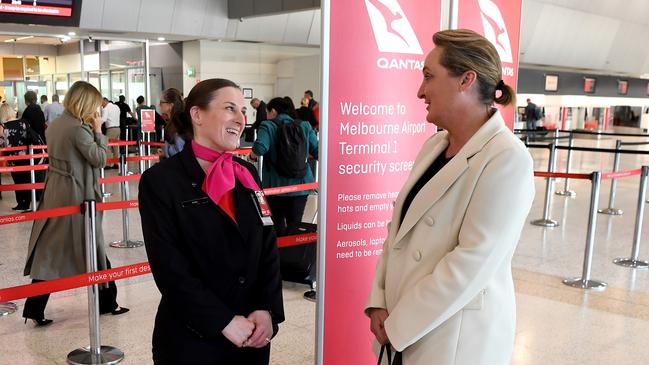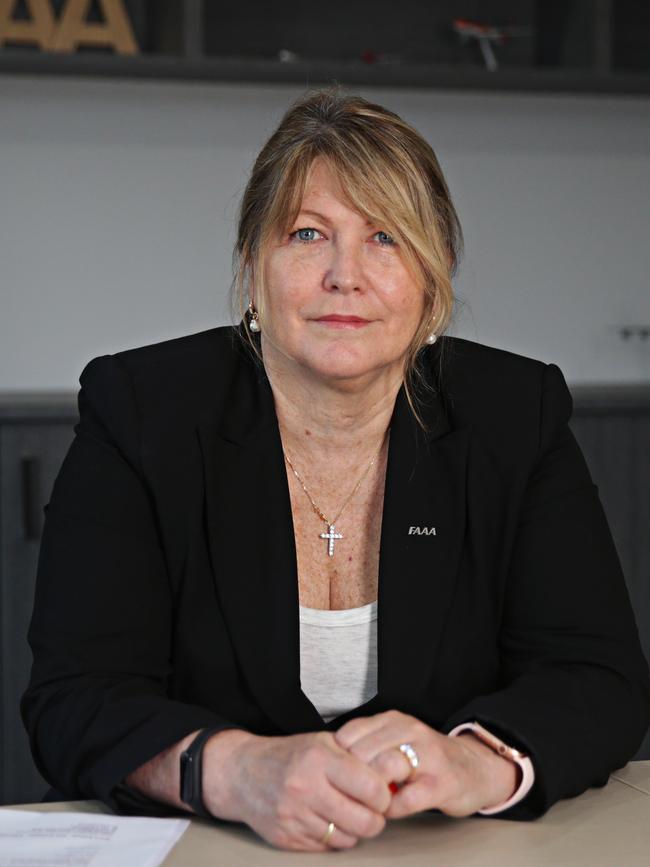What’s wrong with Qantas? Pilots and cabin crew have their say
Veteran pilots and flight attendants at the airline have shone a light on where it has gone wrong, saying angry customers paying high prices for premium service are being served by ‘teenagers’.

Business
Don't miss out on the headlines from Business. Followed categories will be added to My News.
Qantas pilots and flight attendants have revealed how deteriorating pay and conditions for workers have hurt the airline, and angered customers paying high prices for premium service.
Speaking at the CAPA Centre for Aviation, Australian and International Pilots Association president Tony Lucas said it was not unusual for cabin crew to be made up of teenagers who lacked life experience.
He said when he joined Qantas as a second officer almost 30-years ago, flight attendants were typically ex-police officers, nurses and teachers.
“These days I’m dealing with multiple teenagers as part of the crew and they’re a different beast,” said Captain Lucas.
“It’s noticeable for us because issues now tend to blow up a little bit more and that introduces complexity into the operation. Training will get you a certain distance, but expecting 19-year-olds to deal with a lot of the things we deal with is a hard task.”
Flight Attendants Association of Australia federal secretary Teri O’Toole said the job of cabin crew was not as attractive as it once was, with longer shifts, shorter stay overs at destinations, and more time away from family.
She said although advertisements for cabin crew usually received a huge response, the standard of recruits was falling.
“We have people that are being employed that have perhaps never eaten at a fine dining restaurant,” Ms O’Toole said.
“If they’re working for Qantas in first class, it’s hard to deliver that experience. The expectations on them are quite high.”

Ms O’Toole and Captain Lucas emphasised that new CEO Vanessa Hudson needed to pursue a “win win” strategy for company and employees to get the best from staff, and attract the best people.
“Industrial relations has not focused enough on the second word,” said Ms O’Toole.
“If you don’t want to pay, you’re not going to get the right people. It’s as simple as that.”
She pointed to the recent High Court decision dismissing Qantas’s appeal in the illegal outsourcing matter as evidence of the “aggressive” style of industrial relations within the company.
“I think the events of the last few days, if they’ve taught anyone anything, it’s that aggressive litigation is not being driven by the unions,” said Ms O’Toole.
“We try to make deals, we try to make outcomes that are good for the airline and our people. Depending on who’s running the program it can be a really aggressive and constant litigation and I think the events of the last few days have really shown that.”
The Transport Workers Union took Qantas to the Federal Court in 2021 over the outsourcing of close to 1700 jobs.
When Justice Michael Lee ruled in favour of the TWU, Qantas appealed to the Full Federal Court and lost, and then took the matter to the High Court.
The seven judges of the High Court delivered a unanimous decision on Wednesday upholding the original decision by Justice Lee.
Qantas indicated the matter was pursued to the highest court in the land because they believed they had acted within the law when the mass outsourcing occurred during the pandemic.
The matter will return to the Federal Court next Wednesday to decide on a penalty and what compensation Qantas should pay to the affected workers.
Originally published as What’s wrong with Qantas? Pilots and cabin crew have their say





